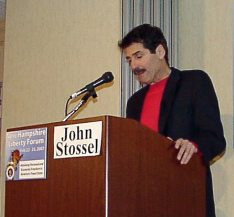
Recently, libertarian television journalist John Stossel vented about the phrase “war on science,” declaring:
“This year is the 10th anniversary of a book called “The Republican War on Science.” I could just as easily write a book called “The Democratic War on Science.”
Stossel explained that his hypothetical book would reveal how many on the political left fear genetically modified organisms (GMOs), give credence to the anti-research views of extremist animal rights activists, and inhibit research in socially delicate areas, such as the role of genetics in human behavior.
This had me scratching my head a bit. You see, there’s already a book that covers that. And it’s the same book Stossel criticized, Chris Mooney’s The Republican War on Science.
I’m one of those weird people who actually reads books before I talk about them. So it didn’t take me long to find the passages in Mooney’s book that detail the ways the political left also engages in science denial.
Right at the start of The Republican War on Science, Mooney writes:
Let’s be fair: those on the political left have undoubtably abused science in the past. While the best environmental groups marshal good science to make their case, more radical groups have occasionally allowed ideology to usurp fact. In objecting to genetically modified food, for instance, Greenpeace has suggested that these “Frankenfoods” pose human health risks… Yet in a 2004 report, the Institute of Medicine of the National Academy of Sciences, the government’s leading independent advisor on science and technology, refused to treat food created through genetic engineering as inherently more dangerous than food created through other forms of genetic modification such as conventional breeding…
Opposition to genetically modified food is still with us, of course.
Mooney added:
We have also seen distortions of science from another camp traditionally associated with the political left: the animal rights movement. Notorious for its attacks on medical researchers, the movement has also made questionable scientific claims to advance its agenda.
Mooney goes on:
[Harvard psychologist Steven] Pinker notes, topics such as the genetic underpinnings of human behavior have gone unstudied out of a “general left-of-center sensibility that anything having to do with genes is bad.” The notion that a tendency toward violence might have genetic roots, for example, raises among many on the Left the fear of eugenics-style solutions.
There you have it. Each of the topics in Stossel’s hypothetical book—GMOs, animal rights extremism, research linking genetics and behavior—was already explicitly addressed in The Republican War on Science. Mooney even says, “in politicized fights involving science, it is rare to find liberals entirely innocent of abuses.” So what’s left (as it were) to talk about?
Well, there’s always evolution.
Stossel opines:
The conflict conservatives have with science is mostly caused by religion. Some religious conservatives reject evolution, and some oppose stem cell research.
But neither belief has a big impact on our day-to-day lives. Species continue to evolve regardless of what conservatives believe ....
While it’s laudable that Stossel acknowledges that species evolve, it’s ignorant to argue that rejection of evolution doesn’t affect our day-to-day lives.
The reason for that is clear: evolution is practically important. Have you seen a doctor recently? Biology underpins medicine—and evolution underpins biology. Your doctor’s basic understanding of how living things work presupposes evolution. Doctors can’t use the same flu vaccine year after year because microbes evolve. Vaccines change to meet that challenge, in a perpetual arms race driven by evolution. Have you eaten recently? Our understanding of evolution is used in agriculture to highlight the dangers of monoculture crops and explain how pests adapt to attempts to control them. Examples of evolution are all around us.
Stossel claims “the left’s bad ideas about science do more harm” than the right’s bad ideas about science. But those of us involved in science education know better.
For those of us involved in science education, what matters is not the political source of rotten antiscience ideas, but the fact that they hamper the education of students and hinder the prosperity of our economies. Left, right, or middle of the road, we ought to be able to agree that it’s important for students to learn about the science as scientists understand it without the interference of political or religious ideologues.
